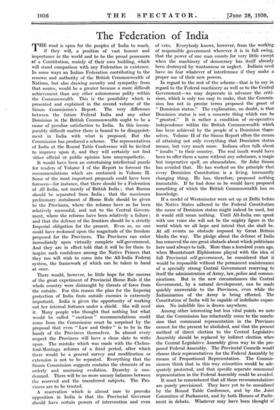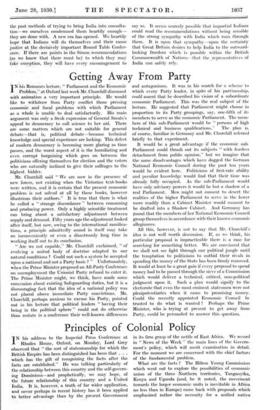The Federation of India
THE road is open for the peoples of India to reach, if they will, a position of vast honour and importance in the world and to be the proud possessors of a Constitution, mainly of their own building, which will stand comparison with any Federation in existence. In some ways an Indian Federation contributing to the renown and authority of the British Commonwealth of Nations, but also drawing security and sympathy from that source, would be a greater because a more difficult achievement than any other autonomous polity Within the Commonwealth. This is' the possibility which is presented and explained in the second volume of the Simon Commission's Report. The very difference between the future Federal India and any other Dominion in the British Commonwealth ought to be a cause of peculiar satisfaction to India. In this incom- parably difficult matter there is bound to be disappoint- ment in India with what is proposed. But the Commission has produced a scheme. The representatives of India at the Round Table Conference will be invited to improve upon it, and they will certainly not find tither official or public opinion here unsympathetic.
It would have been an entertaining intellectual puzzle for readers of Volume I of the Report to forecast the recommendations which are contained in Volume II. Some of the most important proposals could have been foreseen—for instance, that there should be a Federation of All India, not merely of British India ; that Burma should be separated from India ; that the maximum preliminary instalment of Home Rule should be given to the Provinces, where the reforms have so far been relatively successful, and not to the Central Govern- ment, where the reforms have been relatively a failure ; and that the defence of the frontiers should be a strictly Imperial obligation for the present. Even so, no one could have reckoned upon the magnitude of the freedom proposed for the Provinces. The Provinces can enter immediately upon virtually complete self-government. And they are in effect told that it will be for them to inspire such confidence among the Native Princes that they too will wish to come into the All-India Federal system, the framework of which can be taken in hand at once.
There would, however, be little hope for the success of the great experiment of Provincial Home Rule if the whole country were distraught by threats of force from the outside. For this reason the plan for the Imperial protection of India from outside enemies is extremely important. India is given the opportunity of working out her internal fortunes under a shield. She will need it. Many people who thought that nothing but what would be called " cautious " recommendations could come from the Commission must be surprised by the proposal that even "Law and Order" is to be in the hands of the Provinces themselves. In almost every respect the Provinces will have a clean slate to write upon. The mistake which was made with the Chelms- ford-Montagu reforms of a fixed period, after which there would be a general survey and modification or extension is not to be repeated. Everything that the Simon Commission suggests contains the elements of an orderly and unceasing evolution. Dyarchy is con- demned." There will be no more uneasy balances between the reserved and the transferred subjects. The Pro- vinces are to be trusted.
A reservation which is almost sure to provoke • opposition in India is that the Provincial' Governor should have certain powers of intervention and even of veto. Everybody knows, however, from the working of responsible government wherever it is in full swing, that the power of one man counts for very little except when the machinery of democracy has itself already been destroyed by wantonness or neglect. Indians need have no fear whatever of interference if they make a proper use of their new powers.
In regard to the rest of the scheme—that is to say in regard to the Federal machinery as well as to the Central Government—we may deprecate in advance the criti- cism, which is only too easy to make, that the Commis- sion has not in precise terms proposed the grant of "Dominion status." The explanation, no doubt, is that Dominion status is not a 'concrete thing which can be "granted." It is rather a condition of - co-operative independence within the British Commonwealth which has been achieved by the people of a Dominion them- selves. Volume II of the Simon Report offers the means of attaining not only everything that Dominion status means, but very much more. Indians often talk about " insults " to their country. The real insult would have been to offer them a name without any substance, a magic but inoperative spell, an abracadabra. Sir John Simon has avoided that. He has worked on the prineiple that every Dominion Constitution is a living, incessantly changing thing. He has, therefore, proposed nothing inu-nutable. If he had done so he would have proposed something of which the British Commonwealth has no knowledge. • If a model of Westminster were set up at Delhi before the Native States adhered to the Federal Constitution the name of Dominion status might indeed be used, but it would still mean nothing. Until All-India can speak with one voice she will not be the mighty figure in the world which we all hope and intend that she shall be. At all events no obstacle imposed by Great Britain blocks the way. The pledge about the defence of India has removed the one great obstacle about which politicians here used always to talk. More than a hundred years ago, when Moinitstuart Elphinstone played with the idea of full Provincial self-government, he considered that it would be impossible without the permanent maintenance of a specially strong Central Government reserving to itself the administration of Army, law, police and commu- nications. But in the new circumstances the Central Government, by a natural development, can be made quickly answerable to the Provinces, even while the Indianization of the Army is being effected. The Constitution of India will be capable of indefinite expan- sion. No indelible line is drawn anywhere.
Among other interesting but less vital points we note that the Commission has reluctantly come to -the eonelu- sion that communal representation in the Provinces cannot for the present be abolished, and that the present method of direct election to the Central Legislative Assembly should be replaced by indirect 'election when the Central Legislative Assembly gives way to the pro- posed Federal Assembly. The Provincial Councils would choose their representatives for the Federal Assembly by means of Proportional Representation. The Commis- sioners think that in this way minorities would be Ade- quately protected, and that specific separate communal representation in the Federal Assembly could be avoided.
It must be remembered that all these recommendations are purely provisional. They have yet to be considered by the Round Table Conference, and by the Joint Committee of Parliament, and by both Houses of Parlia- ment in debate. Whatever may have been thought of the past methods of trying to bring India into consulta- tion—we ourselves condemned them heartily enough—. they are done with. A new era has opened. We heartily hope. that Indians will do themselves and their cause justice -at_ the decisively important Round Table Confer- ence. If there. are points in the Simon recommendations (as we know that there must be) to which they may fake exception, they will have every encouragement to say so. It seems scarcely possible that impartial Indians could read the recommendations without being sensible of the strong sympathy with India which runs through them. It is upon that sympathy—upon the certainty that Great Britain desires to help India to the outward- looking freedom which is possible within the British Commonwealth of Nations—that the ;representatives of India can safely rely.



















































 Previous page
Previous page